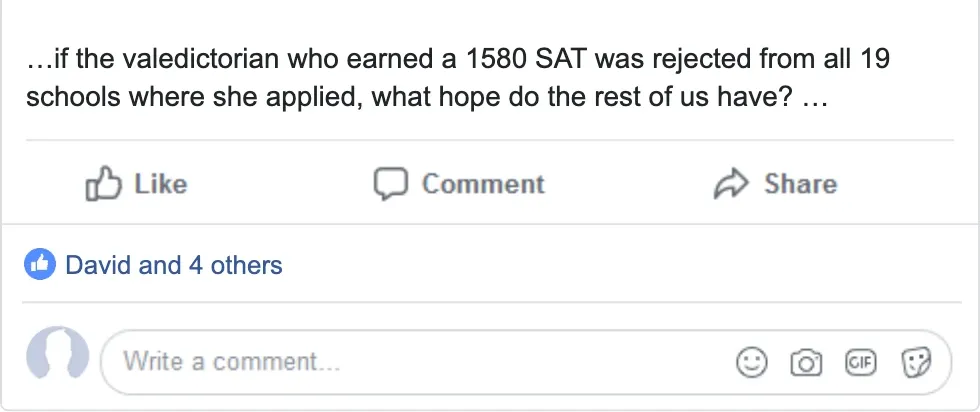Gain an advantage by starting early
Disclaimer:
I’ve been teaching ambitious teens for years. I care about them and I'm beyond frustrated at the level of disengagement and overwhelm our school systems can create in ambitious teens.
But I’m an admissions expert, and also currently an Instructor at Harvard Summer school.
This guide is not just a call for more sanity in our college prep. This healthier approach is also more effective at getting you accepted.

If your family has already begun to talk about preparing for college, but you are still curious about what high school will be like when you get there, you might feel alone– but you’re not.
You may be the only person you know who is your age and is already thinking or talking about college, but there are many, many others you don’t yet know who correctly understand that effective college prep starts much earlier than most people realize.
And I have good news for you:
-
You are starting early, which can give you a leg up on a process that will become quite competitive soon.
-
You are reading this guide, so you can avoid sacrificing the best parts of high school during this journey.
The truth is, the best college prep does not ask you to give up your childhood or sacrifice fun, friends, and sleep in order to be competitive. Quite the contrary.
The healthiest, happiest high school students are far more competitive for highly selective colleges than their stressed-out, overwhelmed peers.
But you need the right strategy.
Because U.S. college admissions, especially for the most selective colleges, have evolved!
Fortunately, there is a much more effective way to prepare for college, and you don’t have to give up your childhood for it.
The myth: What many people THINK colleges are looking for
We conducted an unscientific survey of what people thought colleges were looking for in their freshman classes. While there were a variety of answers, the three most popular, by far, were:
1. Colleges are looking for the smartest students possible.
2. Colleges are looking for the hardest-working students possible.
3. Colleges are looking for the most impressive students
The idea is that admissions officers must be reading through piles of applications, separating them into stacks, and ranking them from “smartest” to “dumbest” or from “hardest working” to “laziest…”
Once those piles are completed, the admissions officers simply take the 2,000 applications at the top of the pile (the 2,000 smartest or most impressive applicants) and reject the rest.
This makes a lot of sense, especially if you come from a country where this is exactly how decisions are made. But, fortunately, this is NOT how things are done at the most selective colleges.

I say fortunately, because when you believe this, college prep can be the most stressful thing in the world because you end up staying up late, waking up early, and burning yourself out trying to prove you are smarter, harder working, or “more impressive” than anyone else.
How do high school students prove themselves without burnout?

Preparing for the admissions process often becomes a race to see who can take the most AP or IB (advanced) classes.
Who can join the most clubs (and become president!)
or create the most clubs.
Who can earn the most awards from MUN or Math & Science Olympiad competitions…
and who can get the highest GPA and test scores.
But if ALL the ambitious students (there are tens of thousands of truly ambitious students every school year who will be applying to college) are trying to show that they are the most impressive by doing these same things …
how can you compete?
Parents of these teens fuel the anxiety when they log into Facebook groups and hype each other up about how impossible the odds are.
This is a quote from part of a post in one such Facebook group of college-bound teens:

I feel great empathy for these anxious parents.
And I feel even more compassion for the stressed-out teens.
It is true that colleges want to admit academically curious and competent students. But to be competitive for selective colleges, it is important to understand the full picture.
The good news is that when you understand the full picture, you’ll discover that being healthy and happy throughout high school actually increases your odds of being competitive for college—if you do it right.
That’s why I’ve written this guide—so you can LOVE high school while becoming the kind of applicant that selective colleges fight over.
Part 2 of 7. What Colleges actually want





